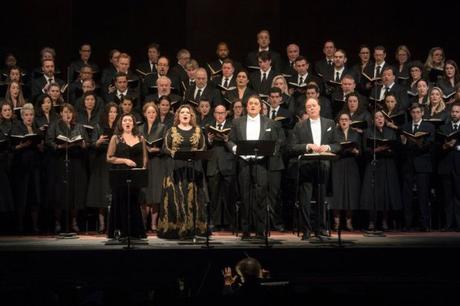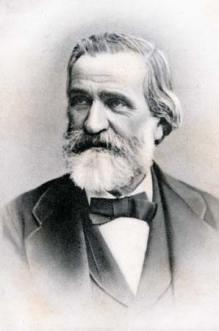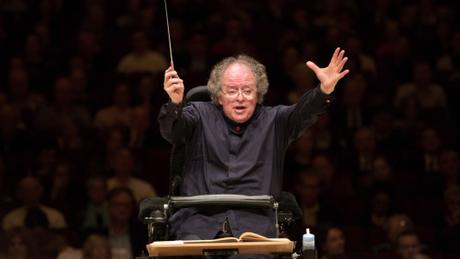 Verdi’s Requiem at the Met: Krassimira Stoyanova, Ekaterina Semenchuk, Aleksandrs Antonenko, Ferruccio Furlanetto, with Met Opera Chorus
Verdi’s Requiem at the Met: Krassimira Stoyanova, Ekaterina Semenchuk, Aleksandrs Antonenko, Ferruccio Furlanetto, with Met Opera ChorusTo hear a great musical masterwork performed to perfection by master craftspeople is worth waiting for. Sometimes the effect can be overwhelming, and sometimes not. Anticipation can get the best of you, knowing that you are in for something out of the ordinary. Likewise, disappointment is around the corner if the outcome isn’t what you expected.
For example, could an unsuspecting Metropolitan Opera audience (and worldwide listeners tuned in to their radios) have known that during the Saturday intermission of Verdi’s Macbeth, performed on the afternoon of January 23, 1988, an elderly audience member would plunge to his death from the auditorium’s top balcony? No one could, until it actually happened. As a result, the rest of the performance was cancelled.
The fall would be ruled a suicide. Bantcho Bantchevsky, the 82-year-old man involved, had been a regular at the opera house for many seasons. In declining health and fortunes, and having suffered a recent heart ailment, Mr. Bantchevsky, who normally sat in the orchestra, decided to end his life in dramatic fashion.
Bantcho chose the time and the place as well as the method of his demise. But most of us are not so fortunate. Life has a way of choosing for us. And, more times than not, our choices are governed by unfolding events.
Nearly thirty years later, on the Saturday afternoon of December 2, 2017, the Met launched its 2017-2018 radio broadcast and Live in HD season with another Verdi masterwork, the Messa da Requiem, or Requiem Mass. (For the background to this towering and emotionally compelling piece, please see the following link: https://josmarlopes.wordpress.com/2013/08/09/the-fab-four-of-opera-mozart-verdi-wagner-puccini-part-three/.)
This was not the first time the Met has performed Verdi’s opus. However, I do not recall a Saturday radio broadcast devoted exclusively to it — at least not lately. Nevertheless, the performance was dedicated, as all four of the sold-out performances were, to the memory of the late Russian baritone Dmitri Hvorostovsky, whom I recently wrote about (please see the following link to last week’s post: https://josmarlopes.wordpress.com/2017/12/04/and-the-curtain-slowly-falls-the-passing-of-classical-music-artists-in-2016-2017/).
The four soloists that headlined this showcase consisted of Bulgarian soprano Krassimira Stoyanova, Russian mezzo Ekaterina Semenchuk, Latvian tenor Aleksandrs Antonenko, and Italian basso Ferruccio Furlanetto. Chorus master Donald Palumbo was in charge of the Metropolitan Opera Chorus, and Music Director Emeritus James Levine led the Metropolitan Opera Orchestra, two of the finest ensembles to be found anywhere.
Starting off softly with the bowing of the cellos, the chorus enters along with the strings. It solemnly intones the first lines, Requiem aeternam dona eis, Domine – “Grant them eternal rest, Lord.” A brief a cappella section follows; then, all four soloists enter. One by one, starting with the tenor, they proclaim the Kyrie eleison (“Lord have mercy, Christ have mercy, Lord have mercy”), which is the characteristic opening line of every Roman Catholic mass. Embellished to a degree by each of the singers, they are joined by the chorus in the concluding repetition of Kyrie eleison.
Suddenly, and without warning (the better to shock audiences into submission), pandemonium breaks out in the orchestra, a veritable Hell on earth: vigorous string movements collide with thunderous whacks on a gigantic bass drum; the blasting of the brass section (Tuba mirum spargens sonum – “The trumpet, casting a wondrous sound”), the chorus practically spitting out the words Dies Irae, dies illa — that fateful Day of Wrath when the heavenly trumpets shall sound and the earth cracks open; where the dead rise up with the living to face their Maker.
In this fiery recreation of the Last Judgment, Verdi summoned up every ounce of skill he had as a musical dramatist. Shades of his previous work, most notably Don Carlos and Aida, resound in the vocal and orchestral lines, along with hints of the masterpieces Otello and Falstaff to come. In the hands of an ensemble up to the task, this impressionable portion of the Requiem should knock the literal socks off us listeners.

I once experienced this feeling when, at Carnegie Hall in May 1982, yours truly was present at maestro Lorin Maazel’s farewell concert of this work with the Cleveland Orchestra and Chorus. I can vouch for the hall’s celebrated acoustics. Indeed, every filigree of sound was clearly and discernibly audible. Those tremendous bass drum smacks shook the very foundation of the place. There was a general feeling of both awesome grandeur and respectful religiosity, as befit the occasion in question.
Few of these qualities emerged in James Levine’s cautious reading, although the Met Chorus shone brilliantly in its moments under the spotlight. The Met Opera Orchestra, too, remained as pliable and responsive as always, if slightly devoid of its customary sheen. None of those spine-tingling moments guaranteed to send a shudder down one’s back, or grab you by the collar, or shake the life-blood out of your system, manifested themselves in this performance. Sorry to say, it remained earthbound.
With the exception of the veteran Furlanetto who, despite some noticeable strain on top, managed to inject pure terror into the haunting words of Mors supebit et natura (“Death and nature will be stupefied”) — a superb acting job, I might add — none of the other soloists approached this level of artistry. Both Stoyanova and Semenchuk came off better vocally than verbally in their individual numbers and duets, with many of their words getting lost in mushy projection. Antonenko, in his solo, Ingemisco tamquam reus (“I groan as a guilty man”), displayed a worrisome wobble every time he strayed into high-note territory.
Then again, the occasion was a somber one, and not the usual festive affair. Even before Hvorostovky’s passing, I mentioned the rather offbeat programming of the Requiem, done in contemplation of the Met Opera’s perilous financial condition.
Let me spell it out for anyone whose grasp of subtlety remains less than acute: to begin the radio broadcast season with a work honoring the deceased (in this case, the late Hvorostovsky, although Verdi dedicated the piece to famed author Alessandro Manzoni) is tantamount to admitting the inevitable: Are we paying tribute to a failing institution — that is, the Metropolitan Opera itself— and the dying art of opera? Are we about to embark on a series of cost-cutting measures (fed by ever-distressing news from our Congress) that will end with curtailment of any future opera seasons?
What Goes Around Comes Around
The title of this post, “Quid sum miser,” is taken from one of the sections of the Latin Mass for the Dead, that is, the notoriously apocalyptic Dies Irae (“Day of Wrath”). It is first voiced by the mezzo in gently hushed tones. She is joined by the soprano and tenor as the solo transmogrifies into a trio. The full Latin text is given below:
Quid sum miser tunc dicturus?
Quem patronum rogaturus?
Cum vix iustus sit securus?
It translates to the following:
Then what am I, a wretch, to say?
To whom should I make my appeal?
When even the just are in need of mercy?
Later that same Saturday and throughout the following week, the news broke that longtime maestro and Met Opera music director James Levine — a revered figure in New York’s classical music circles, and beyond, for well on 45 years — had been accused more than three decades prior of the sexual abuse of several men when they were teenagers.

There have been rumors circulating to that effect for quite some time. Whether or not Met Opera management had anything to do with playing down the gravity of these charges, or whether maestro Levine, 74, (and, by implication, any of his “enablers”) will continue to deny these stories as unconfirmed accusations, the sad part is that only NOW such matters are being taken seriously and investigated.
Consequently, the Met suspended maestro Levine for the rest of the season (he had been scheduled to conduct several more works there), leaving his continued association with the company in doubt. Health-wise, Levine has been in a debilitated physical state for a number of years now, due to numerous back injuries brought about by falls in or about his home. Because of his condition, a specially-constructed conductor’s podium, which rises from below the house’s orchestra pit, was set up for his specific use. What is to become of this contraption?
Along similar lines, New York Times’ classical music critic Anthony Tommasini wrote a self-explanatory postmortem the other day entitled “Should I Put Away My James Levine Recordings?” Do we stop listening to maestro Levine’s many excellent recorded mementos because of these latest developments? One can say the same about other artists in the entertainment and broadcast arena.
Michael Smerkonish, CNN’s television presenter and talk-radio host, voiced similar concerns regarding the likes of Kevin Spacey, Harvey Weinstein, Louis C.K., Bryan Singer, and others. “Is it okay to enjoy the work of those accused of sexual misconduct?” he asked on the air. “Can we as consumers continue to enjoy the fruits of the labor of those who are now under a cloud of suspicion?”
The above-named men weren’t the only ones to have been charged with impropriety. Add to them the names of Michael Jackson, Woody Allen, Bill Cosby, Pablo Picasso, Claude Debussy, Puccini, Wagner, Diaghilev — the list is long and troubling. Although Smerconish mentioned some of these individuals, historically sexual abuse or misconduct, including within the Catholic Church itself, has been far too prevalent, and not only of women but of men and underage children.
“People in the public eye,” Smerconish went on to say, “tend to be larger than life by the definition, but when we hear the sordid details [of their abuse], what does it mean with our past relationships to their work? I’m having trouble making up my mind.” He’s not the only one!
What are we to say, wretches that we are? To whom should we make our appeal? When even the just among us are in need of mercy?
As I mentioned at the outset, the expectation of something out of the ordinary can lead to disappointment. We do not choose the time of our demise. Events unfolding before us, often out of our control, make the choice for us. In order to reconcile ourselves with our Maker, the church teaches us to confess our sins, to be contrite in our confession, and to go and sin no more. We are all fallible and in need of redemption.
The Requiem concludes with this final prayer for salvation:
Libera me, Domine, de morte aeterna in die illa tremenda
Quando coeli movendi sunt et terra
Dum veneris judicare seclum per ignem.
Libera me, Domine, de morte aeterna in die illa tremenda.
Libera me.
Deliver me, Lord, from eternal death on that terrible day
When the heavens and the earth shall be moved
When you will come to judge the world by fire.
Deliver me, Lord, from eternal death on that terrible day
Deliver me.
Copyright © 2017 by Josmar F. Lopes
Advertisements &b; &b;
